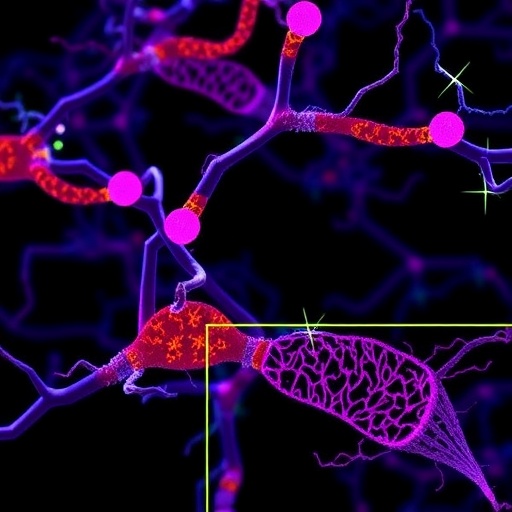A novel informatics technique allows researchers to identify different strains of the same bacterial species.

Credit: UAB
BIRMINGHAM, Ala. – Using a unique bioinformatics technique developed at the University of Alabama at Birmingham, UAB researchers have detected the emergence of new strains of microbes in the human fecal microbiota after obesity surgery. These new strains emerged after surgical disruption of the stomach and upper small intestine. In contrast, the researchers found that strains of the human gut fecal microbiota resembled those found pre-surgery following surgery in the colon, which is the lower part of the gastrointestinal, or GI, tract.
The UAB researchers studied patients undergoing two types of obesity surgery — Roux-en-Y gastric bypass and sleeve gastrectomy. In sleeve gastrectomy, the size of the stomach is reduced. Roux-en-Y gastric bypass also reduces the size of the stomach that receives food, but it additionally creates a surgical bypass of the rest of the stomach and the first part of the small intestine.
“Our results show that, when you change the upper GI tract with obesity surgery, you also change the gut environment, resulting in the emergence of new strains of microbes,” said Casey Morrow, Ph.D., leader of the research team and professor emeritus in UAB’s Department of Cell, Developmental and Integrative Biology. “In the microbial competition for nutrients and
space in the GI tract, the winners are new strains that are more competitive in the new GI tract environment.”
The ability of the informatics technique to discriminate among individual strains of the same species advances analysis of the human gut microbiota and how surgery may alter the microbial community. The human microbiota largely consists of 500 to 1,000 bacterial species that have a mainly beneficial influence on human health, including modulation of the immune system and influences on host metabolism and organ development. Previous studies of the microbiota have been able to determine changes in the relative abundance of various species after obesity surgery, but they could not discern whether this could be due to the replacement of one strain of a particular species by another strain of that same species.
In 2017, the UAB researchers had used their technique — called window-based similarity single-nucleotide-variant, or WSS — to show the first direct demonstration that fecal donor microbes remained in recipients for months or years after fecal transplants to treat patients with recurrent Clostridium difficile infections.
For the report published in the Human Microbiome Journal in December, Morrow and colleagues analyzed fecal samples taken from patients before and one to two years after obesity surgery. The study included 18 patients undergoing Roux-en-Y gastric bypass and six patients undergoing sleeve gastrectomy.
When the pre- and post-fecal samples for the two groups of obesity surgery patients were compared, only 65 percent of the Roux-en-Y WSS scores and 75 percent of the sleeve gastrectomy WSS scores were above the boundary cutoff that identifies related pairs. This meant that, for 35 percent of the Roux-en-Y microbiota pairs and 25 percent of the sleeve gastrectomy pairs, changes from one microbial strain of a bacterial species to another strain had occurred, and in some cases these changes in the microbial community persisted one to two years after the operations. Multiple changes in microbe strains of various bacterial species were identified in most, but not all, of the obesity surgery patients.
In contrast, for five surgery patients who lost segments of the sigmoid colon, which is near the end of the GI tract, 97 percent of the WSS scores comparing pre- and post-surgery samples were above the cutoff, indicating stable strains over time, despite the operations. Three of those patients showed a single new microbe strain in a particular bacterial species. The other two had no new strains. This 97 percent is similar to the stability of gut microbiota seen over one or two years in people who have not had an operation.
“Our study describes, for the first time, the emergence of new microbe strains in the fecal community following alteration of the upper gastrointestinal tract,” Morrow said. “Most probably, the origins of the new strains in the fecal community are the tissue-associated microbe communities of the small intestine. Since the surgery resulted in a permanent physiological alteration, the new microbe strains reflect the response to these environmental changes in the GI tract.”
“In a broader implication,” Morrow said, “the realization that humans can harbor multiple strains of the same microbes provides us with a new appreciation for the complexity of the human GI microbe community. It reinforces the importance of our ongoing studies to examine the impact that other microbiome disrupting treatments, such as antibiotics and cancer chemotherapy, have on the structure of the GI tract microbe community.”
###
Besides Morrow, authors of the study “New microbe genomic variants in patients fecal community following surgical disruption of the upper human gastrointestinal tract” are Ranjit Kumar, Ph.D., UAB Center for Clinical and Translational Science Informatics Institute; Jayleen Grams, Daniel I. Chu and Richard Stahl, UAB Department of Surgery; Kelly Goldsmith, Michael Crowley and David K. Crossman, UAB Department of Genetics and Heflin Center for Genomic Sciences; Peter Eipers, UAB Department of Cell, Developmental and Integrative Biology; and Elliot J. Lefkowitz, UAB Department of Microbiology. All the departments are in the UAB School of Medicine.
Support for the UAB Microbiome Resource came through the UAB School of Medicine, O’Neal Comprehensive Cancer Center at UAB, the UAB Center for Clinical and Translational Science, the UAB University Wide Institutional Core, the Heflin Center for Genomic Sciences, and the UAB Microbiome Center. Support also came from a 2016 Central Surgical Association Foundation Enrichment Award.
Media Contact
Jeff Hansen
[email protected]
205-209-2355
Original Source
https:/
Related Journal Article
http://dx.




